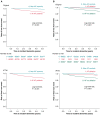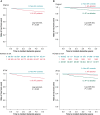Ablation of atrial fibrillation and dementia risk reduction during long-term follow-up: a nationwide population-based study
- PMID: 37097046
- PMCID: PMC10228604
- DOI: 10.1093/europace/euad109
Ablation of atrial fibrillation and dementia risk reduction during long-term follow-up: a nationwide population-based study
Abstract
Aims: This study investigated the epidemiological characteristics of new-onset dementia in patients with atrial fibrillation (AF) and the association of catheter ablation with different subtypes of dementia.
Methods and results: We conducted a population-based, retrospective cohort study using data from the Taiwan National Health Insurance Research Database. In total, 136 774 patients without a history of dementia were selected after 1:1 propensity score matching based on age (with AF vs. without AF). A competing risk model was used to investigate the three subtypes of dementia: Alzheimer's disease, vascular dementia, and other/mixed dementia. Inverse probability of treatment weighting (IPTW) was performed to minimize the impact on dementia risk due to the imbalanced baseline characteristics. After a median follow-up period of 6.6 years, 8704 events of new-onset dementia occurred. Among all AF patients developing dementia, 73% were classified as having Alzheimer's disease, 16% as having vascular dementia, and 11% as having other/mixed dementia. The cumulative incidence of dementia in AF patients was higher than those without AF (log-rank test: P < 0.001 for both before and after IPTW). In patients with AF undergoing catheter ablation, the total dementia risk decreased significantly [P = 0.015, hazard ratio (HR): 0.74, 95% confidence interval (CI): 0.58-0.94] after multivariable adjustment, but not for the subtype of vascular dementia (P = 0.59, HR: 0.86, 95% CI: 0.49-1.50).
Conclusion: Patients with AF have a higher incidence of all types of dementia, including Alzheimer's disease, vascular dementia, and a mixed type of dementia. Alzheimer's disease is less likely to occur in patients with AF undergoing catheter ablation.
Keywords: Alzheimer’s disease; Atrial fibrillation; Catheter ablation; Dementia; Vascular dementia.
© The Author(s) 2023. Published by Oxford University Press on behalf of the European Society of Cardiology.
Conflict of interest statement
Conflict of interest: None declared.
Figures





References
-
- Ott A, Breteler MM, de Bruyne MC, van Harskamp F, Grobbee DE, Hofman A. Atrial fibrillation and dementia in a population-based study. The Rotterdam Study. Stroke 1997;28:316–21. - PubMed
MeSH terms
Grants and funding
LinkOut - more resources
Full Text Sources
Medical

